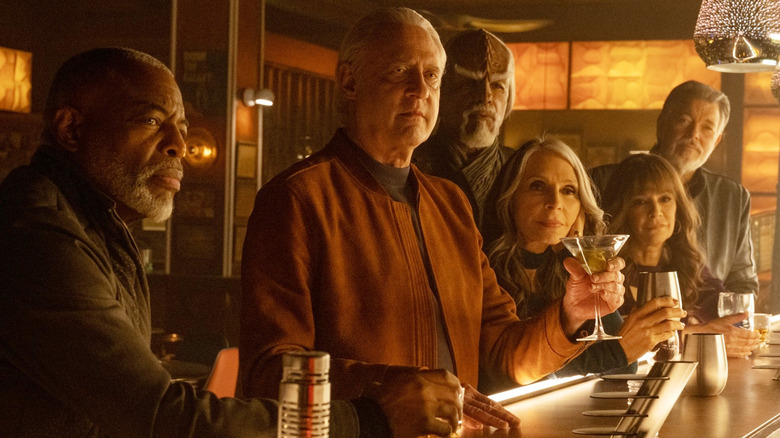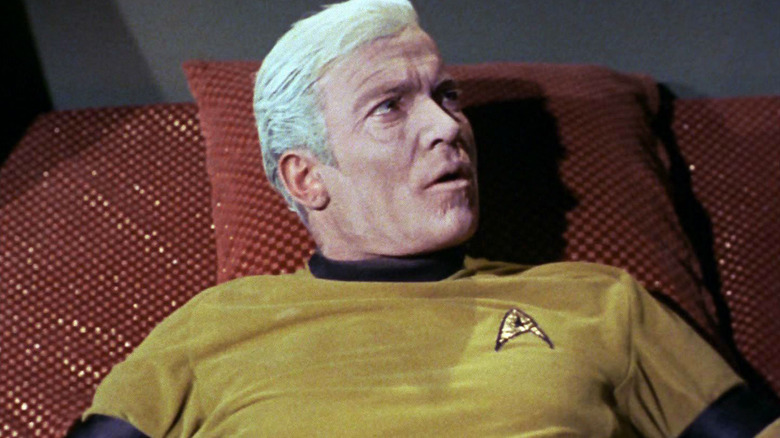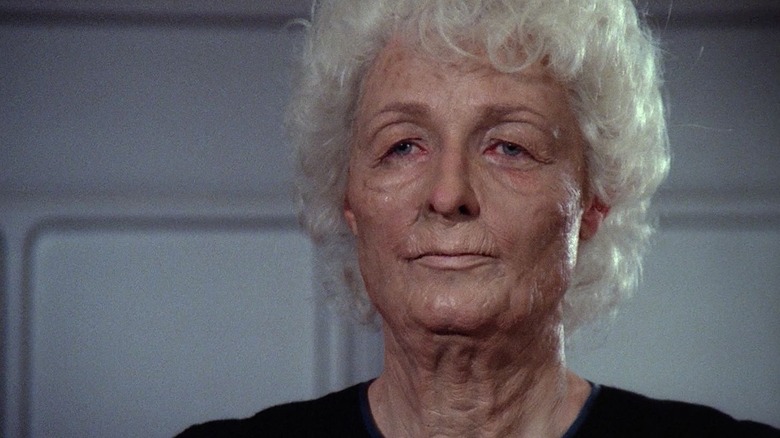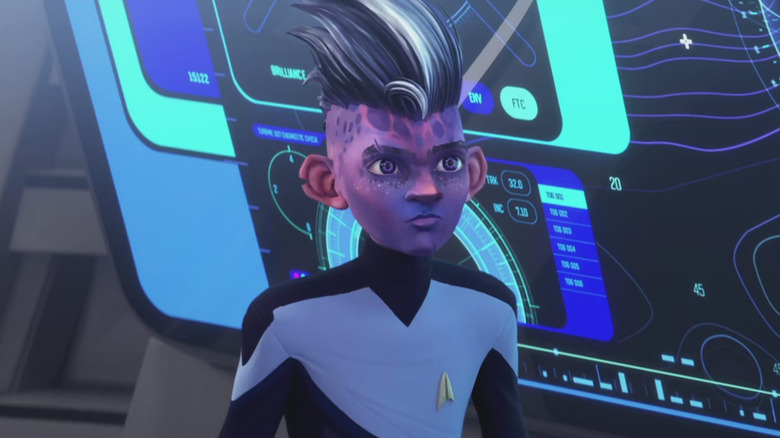Star Trek Is Facing A Fanbase Challenge – But There's A Hopeful Future Ahead
One of the more persistent conversations that has buoyed several decades worth of nerd conversations is the old "Star Trek" vs. "Star Wars" saw. Do you, dear reader, prefer stern diplomacy, mechanically inclined stories, ethical dilemmas, and constant reference to classic literature of the Western Canon? Then "Star Trek" is for you. You may, however, prefer fable-like tales of derring-do, heroic space-bound violence, and archetypal myths of good vs. evil. If you like your sci-fi to have an ancient flavor and fantastical elements out of King Arthur, then you may prefer "Star Wars."
Which one is better? The answer, of course, is "Star Trek." But which one is more successful and widespread? Frustratingly, the answer is "Star Wars." "Star Trek" has long been more successful on TV, telling hour-long morality tales and pushing up against low budgets. It was about multiculturalism and equality. "Star Wars," meanwhile, got its mileage from simple tales of violent victory, massive budgets, and enormous event films that make billions. "Star Trek" may contain enormous ideas, but "Star Wars" is merely enormous.
In an interview with Variety, the makers of "Star Trek" also admitted they find themselves facing a new problem. Not only did they have to acknowledge that they'll never be as huge as their sci-fi cousin, but their fan base is aging out. One can indeed haul old actors out of mothballs and use them to appeal to the 40-to-70-year-old fans who watched "Star Trek" for decades — see: most of "Star Trek: Picard" — but that, it seems, isn't gathering a new generation of Trekkies. Younger viewers, it seems, aren't constantly jumping on board with new "Star Trek" shows, no matter how hip or expensive they are.
The Deadly Years
"Star Trek," despite its cultural ubiquity, has always been something of a niche interest. It is a cerebral, technical, philosophical, and intellectual series. Sure, it had more than its share of ridiculous stories (Allamariane, "Spock's Brain," so much pain), but at its heart, it appealed to engineers and lit enthusiasts. "It's not the largest fan base," executive producer Akiva Goldsman told Variety. "It's not 'Star Wars.' It's certainly not Marvel." It never has been, however much Paramount would like it to be.
"Star Trek" had a taste of a younger audience in 2009 when J.J. Abrams rebooted the franchise to feature a younger, sexier cast. Abrams' 2009 film was the most successful movie "Star Trek" had ever seen up to that point, and it seemed for a moment that high-octane action was the future; gone were the nerdier days of diplomatic contemplation. That high-octane mode of thinking bled into subsequent "Trek" TV shows, leading to programs like "Star Trek: Discovery" and "Star Trek: Picard." However, as modern as these shows were, they weren't scooping up a newer audience; it was old-school Trekkies who were tuning in out of curiosity.
This was confirmed by "Star Trek: The Next Generation" actor and prolific franchise director Jonathan Frakes. Variety asked Frakes how many people have approached him about the new "Star Trek" shows that've released since 2017. His reply was bleak:
"Of the fans who come to talk to me, I would say very, very few. 'Star Trek' fans, as we know, are very, very, very loyal — and not very young."
"Star Trek" needs the youth vote, and that is key to the franchise's future.
Courting the youth vote
CBS President David Stapf backed up Frakes' statement, saying:
"There's a tried and true 'Trek' fan that is probably going to come to every 'Star Trek,' no matter what it is — and we want to expand the universe."
But how is the franchise going to do that? Its first attempt will be to extend the Kelvin timeline films into a fourth chapter. When "Star Trek Beyond" — the thirteenth "Star Trek" movie and the third in the rebooted Kelvin-Verse — disappointed at the box office, Paramount seemingly put that corner of the franchise to bed.
It appears, however, that the subsequent "Star Trek" TV shows haven't been giant hits either, so, in apparent desperation, more movies are in the works. Steve Yockey ("The Flight Attendant") is currently writing a "final chapter" movie for the Kelvin timeline. Meanwhile, Toby Haynes is attached to direct a separate film that's described as an origin story for the entire "Star Trek" franchise. Haynes might be known to some readers as the director of the "Star Trek" spoof episode of "Black Mirror" titled "USS Callister." Will another Kelvin timeline film draw in a fresh audience? Will either of these films make over $500 million the way the 2009 "Star Trek" movie did (assuming they come to pass)? Only time will tell.
The franchise's primary creatives are also developing a "Star Trek: Discovery" spinoff called "Starfleet Academy," set at the titular sci-fi college where all starship officers graduate. "Academy" will follow a new cast of youthful characters in the 32nd century, and the series has ordered an enormous set to be built, the largest in "Star Trek" history. It will be the second show in "Trek" history to feature a mostly under-20 cast, the first being the animated series "Star Trek: Prodigy."
Shows about young people, for young people
Both of the above ideas, however, are based on a fallacy commonly made by showrunners: that kids only want to see shows about their peers. If "Star Trek" was about younger people, the thinking goes, then younger people will tune in, right? "Star Trek," however, has always been about older characters. Here's my personal (and yes, very specific and opinionated) pitch: The central appeal is that the main characters are mature and well-formed, some of them with unbreakable codes of ethics or command styles they formed many years ago. The franchise is about thoughtful professionals who are good at their jobs, and Trekkies like to see them ply their skills with aplomb. Youthfulness is antithetical to "Star Trek." We don't want to see someone grow up. We want to see them already grown up. This is one thing (among others) that "Star Trek: Strange New Worlds" does so well.
The exception to this is "Prodigy," a series about a group of teens in a distant part of the galaxy unfamiliar with Starfleet. When they find an abandoned Starfleet vessel called the U.S.S. Protostar, they are introduced to Starfleet ideals for the first time and learn to grow up with principles. Someone needs to tell the franchise's creatives that they already have their "youth" program ... Oh, wait. It was canceled. (Although Netflix tossed it a lifeline.)
I will hereby offer them the solution, free of charge: don't make more "Star Trek," and don't make younger "Star Trek." Make good, serious, cerebral, thoughtful, slow-moving "Star Trek" that appeals to nerdy kids. The ratings will be lower than you want, but I assure you, you'll be creating a new fanbase that will stick around for decades.
And there will always be nerdy kids. Which means there will always be "Star Trek."



